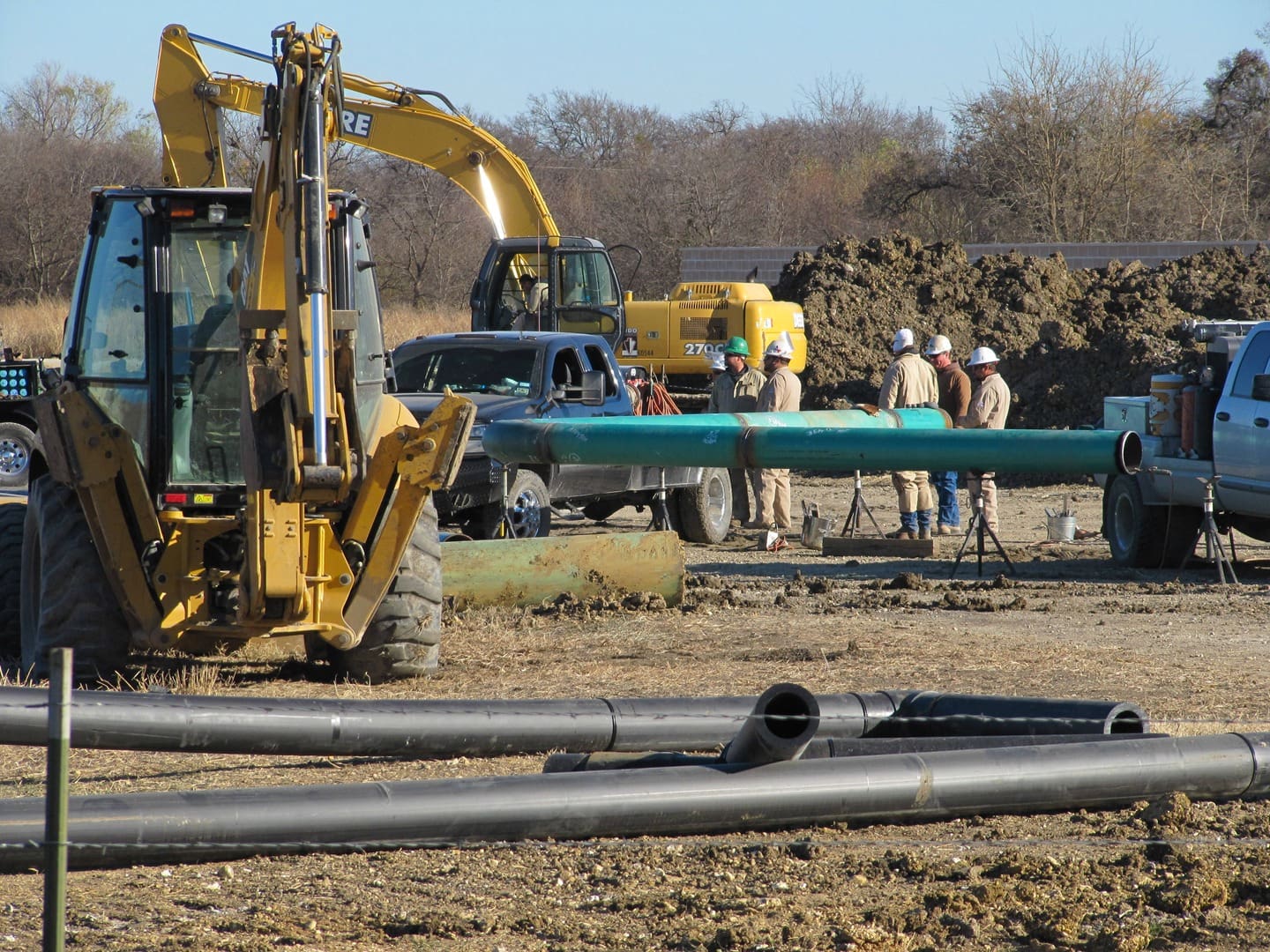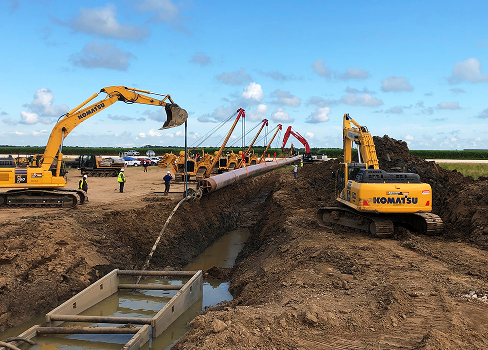7 Questions to Ask Before Contracting Pipeline Construction Services
The Important Overview to Recognizing Pipeline Construction Providers and Their Value
Pipeline Construction services are fundamental to the transport of important resources such as water, oil, and gas. These solutions involve meticulous preparation and execution, sticking to strict safety and ecological requirements. As the industry adapts to contemporary difficulties, comprehending its components and effects ends up being increasingly vital. What aspects add to the growing importance of these services in today's economy? The adhering to sections will discover these vital aspects.
Introduction of Pipeline Construction Services
Pipeline Construction solutions include a series of tasks essential for the installment and upkeep of pipelines made use of to carry numerous compounds, including gas, oil, and water. These solutions are vital for assuring the safe and reliable motion of sources from one location to one more. The procedure typically starts with comprehensive preparation and layout, which considers regulatory requirements, environmental considerations, and logistical obstacles.
Excavation and grading of the land are performed to prepare the site for Pipeline setup when preparation is full. This is adhered to by the actual laying of the pipelines, which entails welding or signing up with sections together to create a constant circulation course. After installment, rigorous screening is carried out to ensure stability and safety and security. Upkeep solutions are likewise given to address any issues that may occur over time. Generally, Pipeline Construction solutions play a crucial duty in sustaining facilities for power and water circulation.
Trick Elements of Pipeline Construction
An effective Pipeline Construction job relies upon a number of essential components that guarantee the effective and secure installation of the Pipeline system. First, complete website analyses are critical, as they recognize the environmental and geographical elements that may affect Construction. Next off, the choice of proper materials, such as fittings and pipelines, is necessary for safeguarding durability and compatibility with the moved materials.
In addition, progressed Construction strategies, consisting of trenchless technology and directional exploration, improve performance and decrease environmental impact. Effective task management is an additional essential component, coordinating labor, devices, and timelines to meet job objectives.
Additionally, interaction among stakeholders, consisting of designers, specialists, and local authorities, guarantees placement on project specs and requirements. Lastly, thorough high quality control actions throughout the Construction procedure make sure compliance with industry criteria and make the most of the Pipeline's functional lifespan. Collectively, these parts create the backbone of an effective Pipeline Construction task.
Safety Criteria and Laws in Pipeline Construction

Governing bodies, such as the Occupational Security and Health Administration (OSHA) and the Pipeline and Hazardous Materials Safety Management (PHMSA), set forth certain needs that control Construction practices. These include methods for devices use, employee training, and emergency situation reaction treatments. By executing these requirements, Construction business not only protect their workers but likewise safe public depend on. Ultimately, extensive safety measures add to the long-lasting success of Pipeline jobs, ensuring they fulfill both operational and ecological expectations.
Environmental Considerations in Pipeline Projects

Ecological factors to consider are important to the planning and implementation of Pipeline jobs. These projects must analyze possible effect on ecosystems, water sources, and regional wild animals. Performing detailed ecological effect evaluations (EIAs) is essential, permitting stakeholders to identify and mitigate risks before Construction begins.
Safeguarding sensitive areas, such as marshes and habitats, frequently requires carrying out certain design attributes or alternative transmitting to reduce interruption. In addition, Pipeline operators are tasked with developing methods for protecting against spills and leakages, which can have disastrous impacts on the environment.
Involvement with local neighborhoods is necessary, as public concerns can cause project adjustments that boost environmental management. Compliance with guidelines set by environmental firms guarantees that tasks fulfill sustainability criteria, cultivating a balance between framework demands and ecological conservation. Inevitably, dealing with ecological factors to consider not just safeguards nature yet likewise advertises area trust fund and task viability.
The Function of Modern Technology in Pipeline Construction
Technology plays an important function in contemporary Pipeline Construction, improving performance and precision. Advanced surveying methods permit specific preparation and implementation, minimizing ecological impact and job delays. Additionally, the integration of automation and robotics streamlines operations, decreasing labor expenses and boosting security this article on Construction sites.
Advanced Checking Strategies
Advanced evaluating techniques play an important function in the effective execution of Pipeline Construction tasks. These methods utilize advanced technology to guarantee precise mapping and analysis of the terrain where pipelines will be set up. Methods such as Geographic Details Equipment (GIS), LiDAR (Light Discovery and Ranging), and 3D modeling make it possible for designers to visualize and assess the landscape, determining possible challenges and ecological issues. By utilizing these advanced tools, teams can enhance precision ready and alignment, significantly reducing the risk of errors throughout Construction. Additionally, real-time data collection permits prompt adjustments and notified decision-making throughout the task lifecycle. Eventually, these evaluating innovations add to boosted effectiveness, security, and sustainability in Pipeline Construction efforts.
Automation and Robotics

Economic Impact of Pipeline Framework
Pipeline infrastructure plays an important function in shaping local economies and helping with navigate to this site profession. By offering a reputable ways of transferring oil, gas, and various other assets, pipes minimize transportation costs and boost supply chain efficiency. This framework attracts investment, promotes job development, and promotes economic development in surrounding locations.
The Construction and maintenance of pipes contribute considerably to neighborhood economies, creating numerous employment opportunities in different markets, from design to labor. The increase of tasks often results in enhanced investing in regional businesses, even more strengthening economic task.
Furthermore, pipelines enhance power security by making certain a secure supply of sources, which is important for residential needs and industrial operations. As regions end up being adjoined with Pipeline networks, they access to broader markets, enhancing competition and economic resilience. Subsequently, the economic impact of Pipeline infrastructure is diverse, influencing both prompt regional economies and broader local advancement.
Future Trends in Pipeline Construction Services
The future of Pipeline Construction solutions is developing in reaction to technical advancements, regulatory changes, and wikipedia reference growing ecological considerations. Developments such as robotics and drones are enhancing evaluation and maintenance procedures, improving safety and security and efficiency. Automation is poised to minimize labor costs and raise precision in Construction procedures. Additionally, the enhancing focus on sustainability is triggering companies to take on environmentally friendly materials and techniques, lining up with worldwide initiatives to reduce carbon impacts.
Governing structures are also adjusting to resolve environmental influences, promoting higher openness and accountability in Pipeline jobs. Moreover, the integration of clever innovations, including real-time tracking systems, is expected to boost the dependability and performance of Pipeline networks. As power needs shift towards sustainable resources, Pipeline Construction services will likely see a rise in projects connected to biofuels and hydrogen transport. In general, these patterns indicate a transformative period for the Pipeline Construction sector, concentrated on technology and sustainability.
Often Asked Inquiries
What Kinds of Pipelines Are Typically Built?
Different kinds of pipelines are frequently constructed, consisting of oil, sewer, gas, and water pipes - Pipeline Construction Services. Each offers distinctive objectives, assisting in the transportation of important resources across areas while sticking to safety and security and environmental policies
How much time Does a Regular Pipeline Task Take?
The duration of a normal Pipeline task differs significantly, frequently ranging from several months to a couple of years. Factors influencing this timeline consist of task intricacy, regulatory approvals, and ecological considerations that must be resolved.
That Controls Pipeline Construction Companies?
Pipeline Construction companies are regulated by various federal, state, and regional agencies, consisting of the Pipeline and Hazardous Materials Safety And Security Administration (PHMSA) and state utility payments, making sure compliance with safety and security and ecological requirements throughout the Construction process.
What Are Usual Materials Made Use Of in Pipeline Construction?
Typical products made use of in Pipeline Construction include pvc, steel, and polyethylene. Each material uses distinct benefits such as resistance, versatility, and longevity to rust, making them ideal for various applications in delivering gases and fluids.

Just How Are Pipeline Construction Expenses Estimated?
Pipeline Construction costs are approximated by examining variables such as product expenditures, labor prices, project complexity, environmental factors to consider, and regulatory needs (Pipeline Construction Services). Accurate price estimation guarantees efficient budgeting and task planning throughout the Construction procedure
Pipeline Construction solutions incorporate a range of activities essential for the setup and maintenance of pipelines made use of to transport different compounds, consisting of gas, oil, and water. An effective Pipeline Construction project relies on numerous key elements that guarantee the safe and efficient installation of the Pipeline system. Advanced evaluating strategies play a crucial function in the successful execution of Pipeline Construction jobs. Different kinds of pipelines are commonly built, consisting of oil, water, sewer, and gas pipelines. Pipeline Construction costs are estimated by assessing factors such as material expenditures, labor rates, job intricacy, environmental factors to consider, and regulative demands.